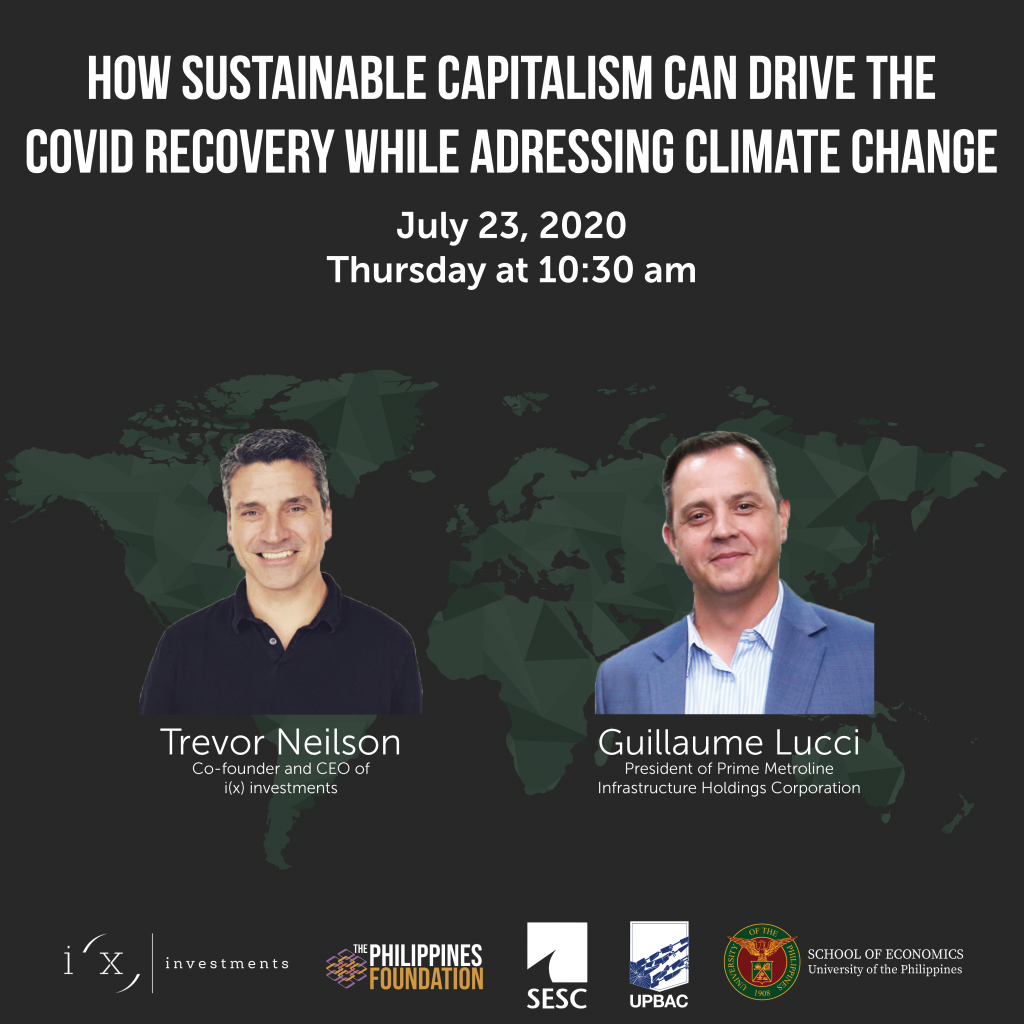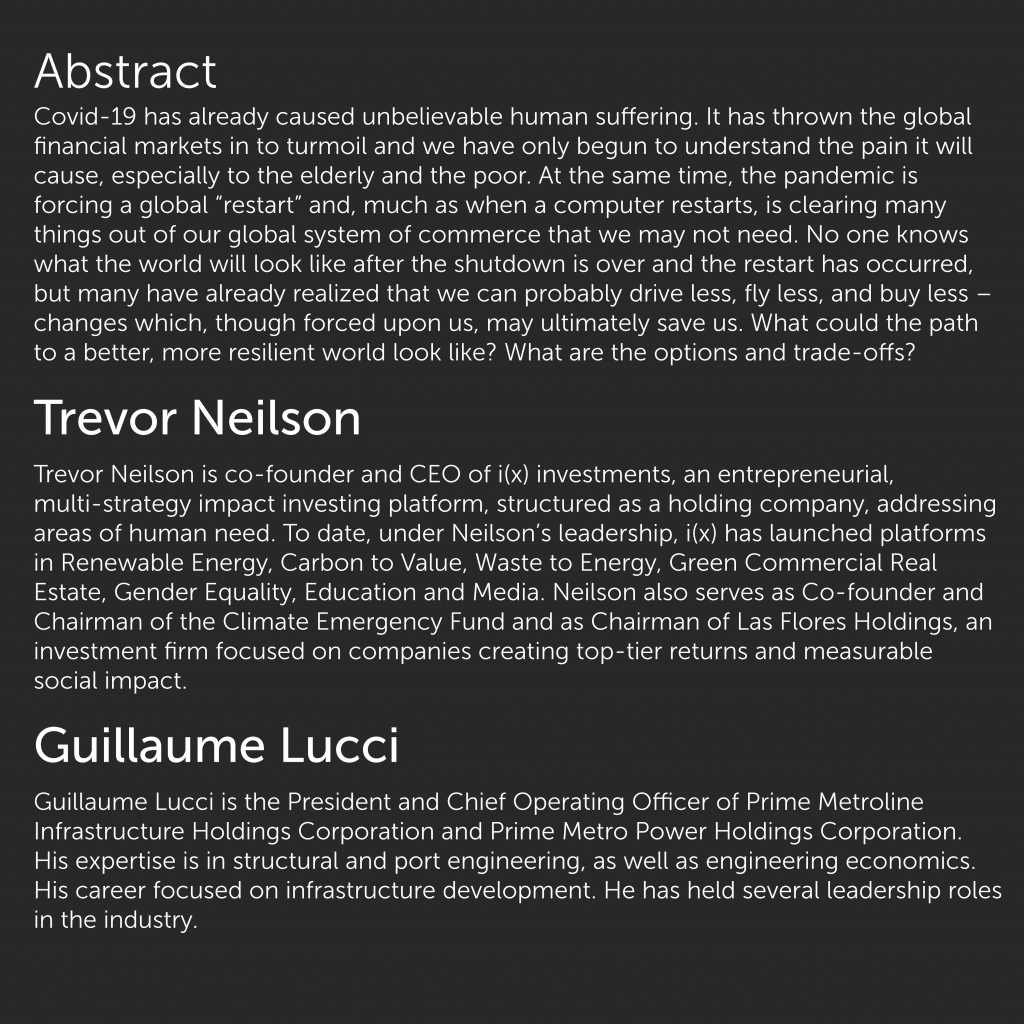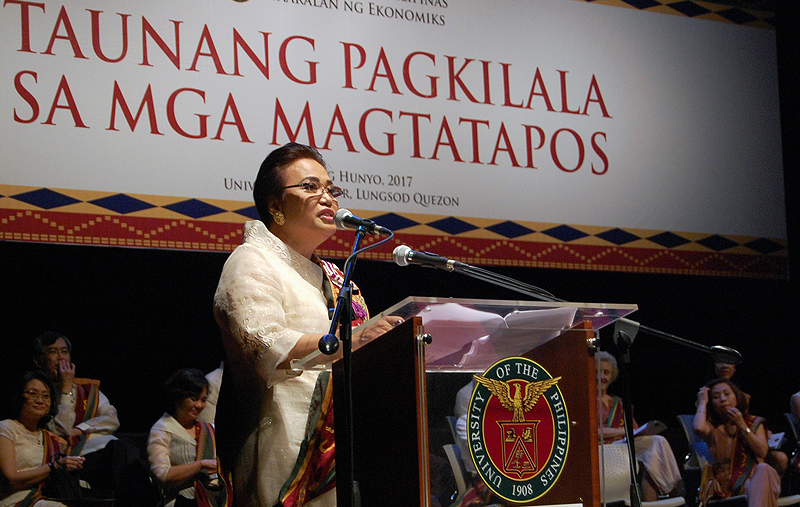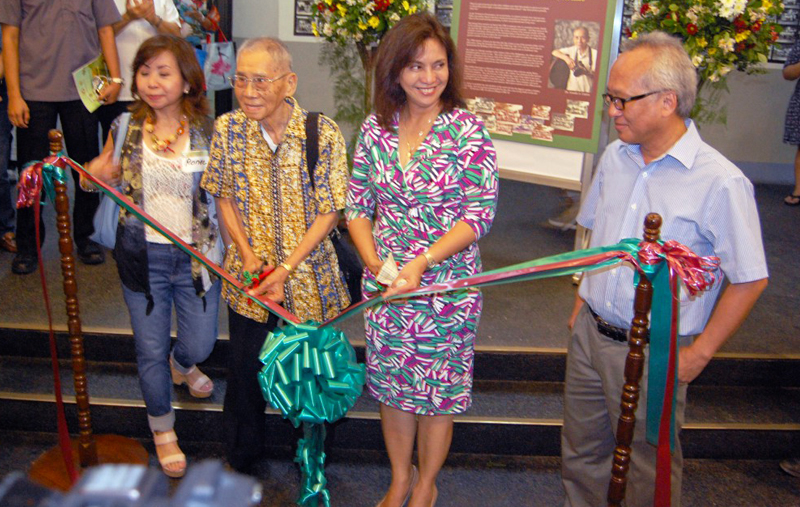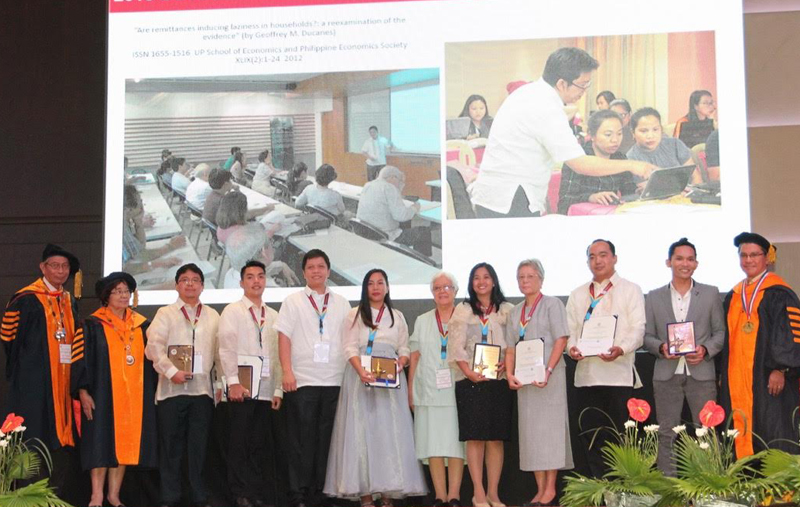Category Archives: Archive
Sicat Award 2020

Ang Gawad Gerardo P. Sicat* para sa Pinakamahusay na Undergraduate Paper ay ipinagkakaloob sa mga mag-aaral na nagsaliksik at sumulat ng pinakamahusay na tesis ukol sa naturang tema sa ilalim ng kursong Economics 199. Ang mga nagwawagi ay pinipili ng isang lupon ng mga hurado na kinabibilangan ng mga guro at mananaliksik mula sa Paaralan ng Ekonomiks.
Ang pagpili sa mga nominado at mananalo ay dumadaan sa mabusising pagsisiyasat ng mga paper na ipinasa ng mga Econ 199 advisers sa komite. Para sa Academic Year 2209-2020, 62 na Econ 199 papers ang natapos. Sa mga ito, 9 ang napili ng mga advisers para maisaalang-alang sa Sicat Award. Ito ay ang mga sumusunod na research papers:
- By his words alone: The economic consequences of Rodrigo Duterte
Authors: Elain Brianne O. Balderas / Alyanna Maria Belen S.D. Bernardo
Adviser: Dr. Joseph J. Capuno - A differential game model of advertising in oligopoly
Author: Joshua Raphael N. Ambrosio
Adviser: Dr. Joseph J. Capuno - Climate change and the Philippine economy: The impact of temperature and precipitation on the three main sectors of the Philippines
Authors: Janella Meara L. Chan / Maria Gabriella S. Gibe
Adviser: Dr. Renato E. Reside, Jr. - Hey, Google! A novel internet-search based macroeconomic uncertainty index for the Philippines
Authors: Vivienne Jeri L. Tieng / Caitlin Eliza C. Yu
Adviser: Dr. Maria Margarita D. Gonzales - How does intimate partner violence affect contraceptive use among women in the Philippines?
Authors: Joaquin Domingo S. de Guzman / Kristoffer John Ronald Y. Lobo
Adviser: Dr. Sarah Lynne S. Daway-Ducanes - Is senior high school worth it? Assessing the employability of senior high school graduates under the K to 12 Basic Education Program
Authors: Zarah Aline V. Gondra / Samantha Louise S. Nepomuceno
Adviser: Dr. Ma. Christina F. Epetia - Older, bigger, better? A study on the effect of age and size on Asian firm performance
Authors: Carlo Manuel P. Gulapa / Therese Carol B. Juat
Adviser: Dr. Maria Margarita D. Gonzales - Out with the old, in with the new: A study on the composite leading indicator approach to forecast Philippine growth cycles
Authors: Colleen Anne T. Chua / Corinne Mariel T. Wong
Adviser: Dr. Joseph J. Capuno - The value of doing good: Analyzing the effect of Corporate Social Performance (CSP) on Corporate Financial Performance (CFP) in the ASEAN Region
Authors: Ian Paolo C. Jorge / Niccolo Miguel N. Rosadia
Adviser: Dr. Sarah Lynne S. Daway-Ducanes
Ang mga nagwagi ng gantimpala para sa Gawad Gerardo P. Sicat ay ang mga sumusunod:
First Prize:
Colleen Anne T. Chua and Corinne Mariel T. Wong, “Out with the old, in with the new: A study on the composite leading indicator approach to forecast Philippine growth cycles”
Adviser: Professor Joseph J. Capuno
Second Prize:
Elain Brianne O. Balderas and Alyanna Maria Belen S.D. Bernardo, “By his words alone: The economic consequences of Rodrigo Duterte”
Adviser: Professor Joseph J. Capuno
* Si Gerardo P. Sicat ay isang guro at mananaliksik ng Paaralan ng Ekonomiks, at isang pampublikong-lingkod. Siya ang kauna-unahan Director-General ng National Economic Development Authority (NEDA). Sa panahong kinikilingan ang proteksiyonismo, naging pangunahing tagataguyod si Doktor Sicat ng mga prinsipyong pang-merkado sa bansa. Itinaguyod din ni Doktor Sicat ang pananaliksik sa ekonomiks sa pamamagitan ng pagtatatag ng Philippine Institute for Development Studies (PIDS) at ng Philippine Center for Economic Development (PCED) noong panahon niya sa NEDA. Siya rin ay kilalang may-akda ng aklat-aralin para sa ekonomiks na malawakang ginagamit sa Pilipinas. Si Doktor Sicat ay kasulukuyang Propesor Emiritus ng Unibersidad.
Mula pa noong 1973, taunang ipinagkakaloob ang gantimpala para sa pinkamahusay na undergraduate paper na itinatag at pinansyal na sinusuportahan ni Propesor Sicat, bilang bahagi ng kanyang pagtataguyod sa pagsasaliksik sa Ekonomiks at kontribusyon sa pag-unlad ng sambayanang Pilipinas.
Economist links manufacturing to more inclusive growth, poverty alleviation
Source: Business Mirror (https://businessmirror.com.ph/economist-links-manufacturing-to-more-inclusive-growth-poverty-alleviation/)
Supporting the expansion of manufacturing is key to achieving sustained and inclusive economic development and to eradicating abject poverty in the Philippines, according to an eminent economist and academic.
Raul V. Fabella, national scientist and professor emeritus at the University of the Philippines School of Economics, said the contribution of manufacturing and industry to local output or the GDP, have declined in recent years, coinciding with developmental slowdown and unabated poverty in the country.
Referencing data from the World Bank for the period 1986-2009, Fabella noted that manufacturing share fell from 25 percent in 1986 to 19 percent in 2009, while industry share fell from 35 percent to 29 percent. In contrast, services share rose from 40 percent in 1986 to 57 percent in 2009.
The Philippines’s manufacturing sector has been bucking the trend observed among the least developed countries (LDCs) that are fast catching up with more developed peers, and is following the pattern observed in mature economies, Fabella said.
He said “catch-up LDCs” tend to post gains in the shares of manufacturing and industrial sectors, while recording either losses or gains in the share of the service sectors.
On the other hand, mature economies like South Korea manifest loss in the shares of industry and manufacturing, even as they mark gains or flat growth in services.
The Philippines “mimics mature economy trends,” Fabella observed during a recent presentation on the topic inclusive capitalism in low-income economies.
Comparing Philippine performance with those of fast-rising developing economies in Asia and those of developed nations from 1986 to 1996, Fabella showed that emerging economies during that period demonstrated big spikes in the shares of manufacturing and industry in relation to GDP.
Indonesia, Malaysia, Thailand, and China all showed robust positive growth for manufacturing and industry during the 10-year period; in contrast, the shares of these two sectors in the Philippines contracted, while services posted healthy expansion during the period.
In the same span of time, South Korea, Germany and the United States registered growth surges in services share, while showing deep cuts in the shares of industry and manufacturing, Fabella added.
In terms of poverty reduction, meanwhile, Fabella cited figures showing how poverty rates in the Philippines were much lower than either China or Vietnam circa 1990, but that by around 2010, China and Vietnam had drastically lowered their poverty rates, while poverty in the Philippines remained high, having gone down only slightly.
The economist stressed that institutional and policy changes are needed to stimulate Philippine economic growth and significantly slash high poverty rates.
He suggests “embracing rather than fearing a weak peso to sustain investment-led growth.”
He also calls for the scaling up of the quantity and quality of Philippine infrastructure under the government’s “Build, Build, Build” program, and seeks the lowering of the cost of power, including by connecting the Visayas and Mindanao grids to give substantial new capacity to the Visayas region.
His other recommendations include for the government to amend the Public Service Act and lift the constitutional limits to foreign ownership, and continue its strategic retreat to its core competence by, for example, privatizing the Metro Rail Transit and Ninoy Aquino International Airport 1 and 3.
RVF: Embrace weaker peso
Source: Business Mirror (https://businessmirror.com.ph/embrace-weaker-peso/)
The government should welcome a weak peso rather than fear it if it wants to cut poverty faster and attract more foreign investments, according to an economist from the University of the Philippines (UP).
In a presentation at the Ayala-UP School of Economics (UPSE) Forum on Monday, National Scientist and UP Professor Emeritus Raul V. Fabella said a weak peso will make the Philippines an attractive investment destination and will encourage businessmen to consider long-term investments in the country.
To significantly reduce poverty incidence in the country, Fabella said the ratio of foreign investments to total investments should go up to as much as 30 percent.
“Even up to now, China’s [foreign] investment rate is around 40 percent. With 30 percent, we will be able to improve our infrastructure. To make it sustainable, the Philippines should have open markets and, I claim, that we should embrace rather than fear the weak peso,” he said.
However, Foundation for Economic Freedom Vice Chairman Romeo Bernardo said he does not agree that a weak peso can help cut poverty faster.
Bernardo also added allowing the peso to depreciate further just to make the country’s business environment more competitive could hurt the poor.
A weak peso would make imported products more expensive. This is a major concern, especially for a country like the Philippines—a net food and fuel importer.
“[A weaker peso] could lead to labor demands for higher wages and feed inflation further. This will not only negate the depreciation we need but could lead to a real appreciation, not to mention the impact of inflation on the poorest sectors,” Bernardo said.
But Fabella said the Philippines could take a cue from China, whose economic success was largely due to its decision to allow the entry of more foreign investors. He added that China’s economic success was ushered in by Deng Xiaoping, who opened his country’s doors to the world after Mao Zedong’s death in 1976.
Allowing free enterprise, foreign investment, and earning from exports enabled China to lift 600 million of its citizens out of poverty between 1980 and 2014. Poverty incidence rate fell to ,6.5 percent in 2014, from 88 percent in 1980.
Fabella said the government should also roll out improvements in the country’s infrastructure and lower the cost of power to attract more foreign investors.
He said lowering power costs could include exempting manufacturing firms from paying feed-in tariffs and completing the so-called One PHL Power Grid, as the country’s power grids remain “fragmented.”
Fabella said the government should consider continuing its privatization efforts, which could be aided by the lifting of restrictions in some economic sectors.
He noted that the privatization of government’s telecommunication assets in the 1990s enabled the business-process outsourcing sector to flourish in the Philippines.
Addressing poverty is one of the primary targets under the Millennium Development Goal (MDGs) and the new Sustainable Development Goals. Under the MDGs, poverty should have been halved by 2015. The SDGs aim to wipe out poverty by 2030.
However, the Philippines failed to meet its target of goal of cutting poverty incidence to 17 percent by 2015 under the MDGs. The target was based on the 34-percent rate in 1990, the baseline year for the MDGs.
In October former UPSE Dean Ramon Clarete said the Philippine GDP must grow by at least 6 percent every year until 2030 to eradicate poverty. Clarete said this economic growth should be accompanied by a 5-percent annual growth in per-capita income over a period of 25 years.
GDP growth in the Philippines averaged 6.2 percent between 2010 and 2015. In 2016 GDP expanded by 6.9 percent and 6.4 percent in the first semester.
Growing the economy, Clarete said, requires making food cheap and accessible for all as well as boosting the country’s trade and investment growth. Clarete noted that rice remains expensive not only for consumers but also for farmers.
Data showed that this is largely due to expensive trade costs. Clarete said trade costs in the Philippines are very high. The United Nations Economic and Social Commission for Asia and the Pacific pegged trade costs at 50 percent of world prices.
Commissioner Guanzon guest speaker at the 2017 UPSE recognition program for graduating students
Commission of Elections Commissioner Ma. Rowena Guanzon was the guest of honor and speaker at the 2017 Recognition Rites of the U.P. School of Economics held on 23 June 2017. You may read her speech here.
She was introduced by Dr. Cielo D. Magno, Assistant Professor at the UP School of Economics (pictured below). You may read her introduction here.
UPSE has 5 new professors emeriti
From left: Professors Florian A. Alburo, Ruperto P. Alonzo, Gwendolyn R. Tecson, Dante B. Canlas, and Benjamin E. Diokno
UPSE Alumni Homecoming 2016 – UP Street bEats
Vice President Maria Leonor “Leni” Robredo (alumni Batch ‘86) joins her UPSE family during the annual alumni homecoming, dubbed UP Street bEats, last 22 October 2016 at the UPSE grounds.
Joining the Vice President are the other cabinet members from UPSE (from Left to right), Dr. Ernesto Pernia (NEDA); Dr. Benjamin Diokno (DBM), Sec. Liza Maza (NAPC), Mr. Ramon Lopez (DTI) and Dr. Arsenio Balisacan (PCC).
Earlier in the program, the first UPSE Dean, Dr. Amado Castro, led the alumni in the launch of a photo exhibit, Ibang Klase si Doc, a collection of class pictures taken over the years by Dean Amado.
Two hundred alumni came to this event for a night of fun and renewal of ties with the UPSE community.



